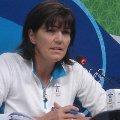Renee Smith-Valade's official title is Vice President, Communications. And reporters who attend the Vancouver Organizing Committee's (VANOC) joint daily briefing with the International Olympic Committee (IOC) are quite familiar with her, as she serves as the official spokesperson for VANOC. Smith-Valade told VOA one of the key communications objectives for the Vancouver Olympics was to present Canada's linguistic duality of English and French, which are also the two languages of the IOC. "We wanted to raise the bar a bit and right from the way in which we recruited the communications staff, to my own commitment to French, we've tried to build a communications team that is fluently bilingual. And so whether it's here [in the Main Press Center] or in any of the other press centers, our spokes-people are able to answer questions in both French and English and not rely on the simultaneous or the consecutive translation," she explained. Smith-Valade emphasized that with great teamwork, anyone who is speaking on behalf of the organizing committee is well prepared. When the committee believes there are issues better addressed by others, they invite them in to field questions from the media.
"From our side we will often bring our leaders of transportation, of ticketing, of athlete experience, to make sure that as corporate spokes-people we're supplementing what we can say with people who are truly in the weeds on these subjects every day," she noted. Smith-Valade has previous Olympics experience. Fresh out of college she worked for five years for the organizing committee leading up to the 1988 Calgary Winter Games in Canada. After some years in politics in Calgary, she worked in public relations for eight years in the airline industry, before taking the VANOC job in 2005.
She credits her time in the airline industry for having her well-prepared for her role at these Olympics, especially dealing with the death of Georgian luge racer Nodar Kumaritashvili in a practice accident the day of the opening ceremonies.
"I would say that it is my crisis training in the airline industry that helped me know at that moment when you feel emotionally paralyzed what to do and how to start communicating that sad news," she explained. Smith-Valade added that the story is still one that VANOC officials are dealing with.
"It was a tremendous shock to all of us, particularly in the contrast; we were in the middle of preparing the final communications for the joyous start of the opening ceremonies and it happened at the same time," she added. "So it's been an ongoing issue throughout the Games, and we have been challenged everyday to make sure that we're not saying anything that will put us in a position potential legally down the road, because it's difficult to say what's going to come from his death." Knowing how to answer the tough questions from the media, Smith-Valade said, is key.
"It's really standing firm and not letting those kinds of questions get you down because they are going to come," she noted. "They came in Calgary. I went to Beijing, and I went to Torino. The tough questions come in the first five or six days of the games, and if you're ready for it, and you're composed, and you feel confident in your answers and the confidence that the best part of the Games is still to come, then you make it through those sessions." Renee Smith-Valade said in addition to making it through the media sessions, she and her staff have also worked hard in making sure the Vancouver Olympics Web site has been a source of good, fast, accurate and detailed information about the Winter Games.

